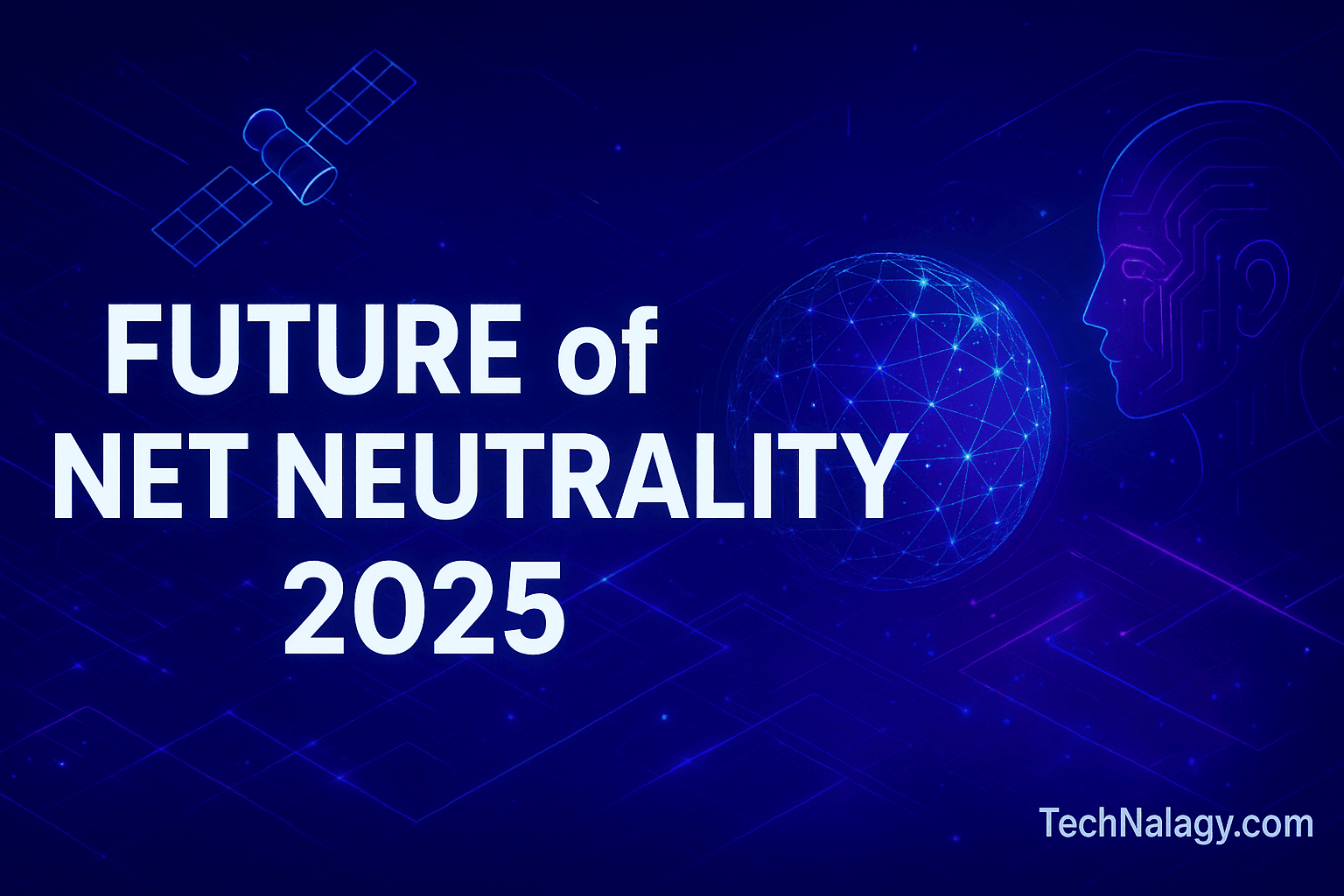The Future of Net Neutrality: What You Need to Know in 2025
Introduction
In 2025, conversations about net neutrality are once again at the center of digital policy, sparking debates among lawmakers, internet service providers (ISPs), tech companies, and everyday users. At its core, the principle of net neutrality is about keeping the online world open, fair, and accessible—where all traffic is treated equally.
But the rules around it have shifted dramatically over the past two decades. From the Federal Communications Commission (FCC) battles in the U.S. to strong protections in Europe, the future of an open internet continues to evolve. For consumers, this debate isn’t abstract—it directly impacts how we stream videos, play online games, run businesses, and even access news and information.
In this article, we’ll explore the future of net neutrality in 2025, its global impact, the pros and cons, and what everyday internet users need to know to stay informed.
Table of Contents
What is Net Neutrality and Why Does It Matter?
Net neutrality is the principle that ISPs should treat all internet traffic equally, without blocking, throttling, or prioritizing certain services for financial or competitive gain.
The three main rules are:
- No Blocking: ISPs cannot block access to lawful websites, apps, or services.
- No Throttling: Providers cannot deliberately slow down (or speed up) certain types of traffic.
- No Paid Prioritization: ISPs cannot create “fast lanes” for companies willing to pay extra, while slowing down others.
Why does this matter? Because without net neutrality, ISPs could decide which services load faster or even which ones survive. Imagine streaming Netflix with constant buffering because your ISP has a deal with a competitor—or struggling to launch a small online business because your site doesn’t get equal bandwidth.
The Evolution of Net Neutrality Laws
The battle over net neutrality began in the early 2000s, as broadband became mainstream. Some key milestones include:
- 2005–2010: The FCC issued guidelines encouraging ISPs to treat traffic equally.
- 2015: Strong net neutrality rules were passed under the Obama administration, classifying broadband as a utility under Title II of the Communications Act.
- 2017: The Trump administration’s FCC repealed these protections, sparking lawsuits and state-level action.
- 2021–2024: The debate resurfaced, with calls for reinstating strong federal protections as digital monopolies grew.
Globally, the story differs. The European Union enforces strict neutrality rules, while countries like India and Brazil also adopted strong protections. Others, particularly in Asia and Africa, have weaker or inconsistent frameworks.
The Open Internet in 2025 – The Current Landscape
As of 2025, the U.S. remains divided on the principle of an open internet. While some states have passed their own protections, federal policy is inconsistent. Globally, however, there’s growing momentum toward strengthening digital rights, as governments recognize the internet as critical infrastructure.
Technological advancements are also reshaping the debate:
- 5G Networks: While they offer faster speeds, they also allow more granular traffic management, raising questions about fairness.
- AI Traffic Management: Artificial intelligence can optimize networks, but it could also be used to favor certain services.
- Cloud and Streaming Dominance: With platforms like Netflix, YouTube, and Twitch consuming massive bandwidth, ISPs are tempted to charge differently for heavy users.
The clash between ISPs, who argue they need flexibility to manage networks and fund infrastructure, and advocates of a free internet, who demand equality of access, is fiercer than ever.
Why Net Neutrality Matters for Everyday Internet Users
Streaming Services and Online Entertainment
Imagine a world where Netflix or YouTube doesn’t load properly unless you pay extra for a “premium internet package.” Net neutrality prevents ISPs from creating such discriminatory pricing models. Without it, ISPs could favor their own services or those of paying partners.
Online Gaming and Latency Issues
Gamers know how critical low latency is. If ISPs prioritize traffic from one gaming company over another, it could ruin competitive balance. The principle of an open internet ensures fair treatment of all online games and platforms.
Social Media and Free Expression
Platforms like Twitter, Facebook, and TikTok thrive on equal access. Without neutrality, ISPs could slow down or restrict platforms that compete with their interests, limiting freedom of expression.
The Business Side of the Open Internet
From a business perspective, the principle of an open internet shapes the digital economy.
- For ISPs: They argue that regulations limit their ability to innovate and fund infrastructure expansion. They claim prioritization could help cover costs and deliver better service.
- For Consumers and Small Businesses: Neutrality ensures that a startup website loads as fast as a tech giant’s site. This protects competition and prevents monopolies.
- For Tech Giants: Companies like Google, Netflix, and Amazon largely support net neutrality, since discriminatory practices could hurt their global reach.
The tension boils down to this: ISPs want more control over pricing models, while consumers and advocates fight to keep the internet open and equal.
Net Neutrality and Digital Rights in 2025
Net neutrality is deeply connected to digital rights, including access to information, privacy, and online freedom. Without protections, ISPs could act as gatekeepers, deciding what content users can easily access.
For a deeper exploration of digital rights in 2025, check out Digital Rights 2025: Online Freedom. This connection shows that neutrality isn’t just about speed—it’s about protecting the foundation of a free and open internet.
A Global Perspective on Net Neutrality
While the U.S. has flip-flopped on rules, other regions are clearer:
- Europe: The EU enforces strict regulations, ensuring ISPs treat traffic equally. Enforcement has been strong, though some critics argue loopholes still exist.
- Asia: India banned Facebook’s “Free Basics” for violating neutrality. However, some countries allow zero-rating services that skirt around the principle.
- Latin America & Africa: Policies vary, with some nations adopting neutrality while others prioritize infrastructure growth over regulations.
These global differences show that the future of net neutrality may not be uniform—it will depend on regional politics, economics, and public demand.
The Debate – Pros and Cons of Net Neutrality
Benefits of Net Neutrality
- Protects consumer choice and fair access.
- Encourages innovation by giving startups equal opportunity.
- Prevents ISPs from acting as internet gatekeepers.
- Safeguards freedom of speech and expression.
Criticisms of Net Neutrality
- ISPs argue that heavy regulation discourages investment in infrastructure.
- Some economists believe market competition—not regulation—should determine pricing models.
- Paid prioritization, they argue, could improve service for those who need it most.
For an in-depth advocacy perspective, the Electronic Frontier Foundation (EFF) offers strong insights into why net neutrality must be protected in the digital age.
What the Future Holds for Net Neutrality
The future of net neutrality in 2025 and beyond will depend on:
- Policy Shifts: Will the U.S. reestablish strong federal protections?
- Technology Evolution: As AI, 5G, and even satellite internet expand, managing traffic fairly becomes more complex.
- Decentralized Internet: Projects based on blockchain and peer-to-peer networks may reduce ISP power, shifting the balance of control.
- Consumer Advocacy: Public demand for fairness will continue to pressure lawmakers and regulators.
In short, the next decade could see either stronger protections that enshrine net neutrality globally—or a fragmented internet where rules vary widely.
Conclusion
In 2025, net neutrality remains one of the most important digital rights issues. It affects everything from the shows we watch and the games we play, to the businesses we launch and the voices we hear online. Without it, ISPs could reshape the internet into a tiered system, restricting access and stifling innovation.
As technology advances, the fight for an open and equal internet is far from over. For everyday users, staying informed and supporting digital rights is essential to ensuring that the future of the internet remains fair and free.

Kamran Khatri is the founder of technalagy.com, where he shares insights on AI, future tech, gadgets, smart homes, and the latest tech news. Passionate about making innovation simple and accessible, he writes guides, reviews, and opinions that help readers stay ahead in the digital world.


